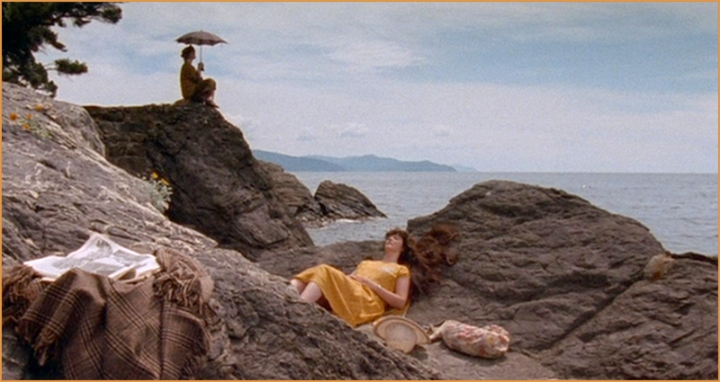
#125. Enchanted April (1992, Newell)
Bitter Moon was the final film in the ‘Relationships’ section of my 1992 watchlist with Enchanted April segueing into ‘Women!’. Four women, in varying degrees of desperation, seek rejuvenation away from their husbands and the rainy cobbledom of 1920’s London in an idyllic Italian castle for one month (guess which). Contemplative solitude and reflection against the tabula rasa pastoral gardens provides a backdrop for magical realism. Set-up conflicts, all involving marital strife, fade away in favor of reconciliation. I wanted to feel the hope and power of sojourn spirituality at work in Enchanted April…but it proves impossible.
Based on a novel of the same name written by Elizabeth von Arnim in 1922, its approach to marriage certainly reflects the era of the story’s inception. It dares to present marriage as this broken down union lacking in communication, respect, and understanding, only to gloss over everything for an unearned whole; a much less forgiving resolution for a film made in 1992. Sure, the magical realism suggests the potential for reset reality once everyone returns to London, but “that’s another story”. Give me that then, not this. This is like A Midsummer Night’s Dream with unhappy spouses instead of young love. No thanks.
These marriages seem to be dead ends all-around, so there’s nothing to root for besides the women finding inner peace with themselves for themselves. At first that’s the focus, and then one by one the men come clomping, or humming, back in. The women’s aim for identity, agency, and hell, even just mutually respected companionship is invalidated, and all in the name of putting all your eggs in the escape-to-the-countryside basket.
A paragraph of questions:
So what, Frederick (Jim Broadbent) now loves Rose because she throws herself at him? It was her prudishness that needed to change? Not Frederick’s philandering or inattentiveness or endless humming? Rose is just so bowled over by Frederick’s arrival that all her feelings and doubts are reconciled? Even though he didn’t even go there for her in the first place? And George (Michael Kitchen) was taken in by Rose (Miranda Richardson) and not Lady Caroline (Polly Walker), all because he’s got shitty eyesight? Even though he comments not once, but twice, on how much Rose looks like the the Madonna? Give me a break. Give me lots of breaks. In fact, just give me all the breaks.
The blossoming connection between Rose (Miranda Richardson) and George is sapped in an instant by the film and Rose, as if it had been nothing of consequence. Our clairvoyant guide into these blissful surroundings is the skittishly exhausting and intrusive Lotte (Josie Lawrence). Enchanted April feels as if it were made by Lotte, like it takes place in her deluded head or something. We wait for the other shoe to drop in her desperation but it never does. Because it turns out that for her there will be no rude awakening. Everything she says about her fellow tenants and the power of the castle turn out to be correct. It doesn’t matter that she’s inconsiderate and oversteps her bounds by trying to solve everyone’s problems.
I’ll admit that part of my dislike of Enchanted April comes from a rare break on my ‘expectations’ rule. Basically, and I say this with an asterisk to risk generalizing, it’s a big pet peeve of mine to mark against a film by saying ‘it’s not what I expected’. That puts all its supposed value onto the individual’s preconceived notions, either from marketing, reputation, or picked up assumptions. The weight of preconceived notions on a film’s value gives the advantage to said preconceived notions, not the actual content. I take issue with that. These are natural feelings to have of course; however, there are constructive ways to frame them, meaning engaging with what the content is opposed to what the content isn’t.
This rant is to say that, yes, in this case, for some reason I thought Enchanted April was going to be about female bonding surrounded by lots of pretty flowers, and not about reconciliation with husbands, so that certainly didn’t soften the blow. Nevertheless, I’m all for buying into romanticized fairy-tale hope (as in A Tale of Winter), as long as the material earns it. And Enchanted April does not earn it.
The relaxed pace interspersed with low-key moments of characters soaking in their new temporary milieu with hard-earned basking is appropriately sweeping. My favorite moment comes when a small lizard makes its way up Miranda Richardson’s hair, and so despondent in this moment she allows it. Speaking of Richardson, she is able to use her naturally cold demeanor for exacting enigmatic ends and unexpected subtle reactive strokes of comic timing.
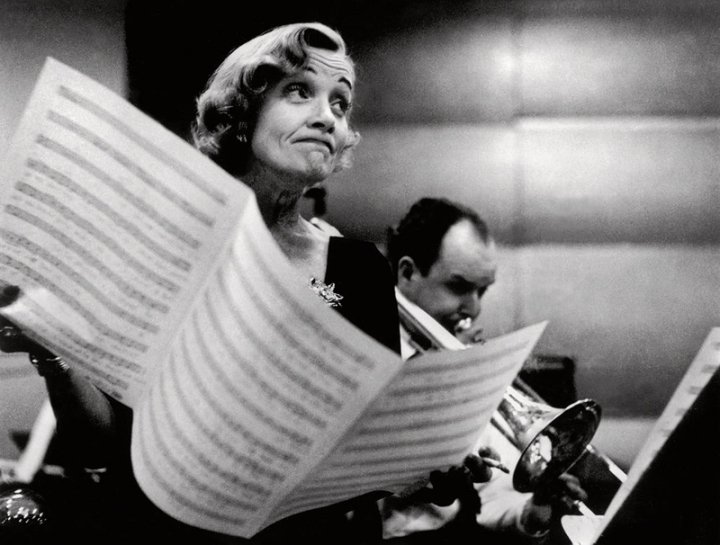
#126. Marlene (1984, Schell)
Maximilian Schell makes a mistake trying to engage with Marlene Dietrich near end of her life, and knowing each other going back to Judgement at Nuremberg twenty years earlier doesn’t help smooth things over. In fact, nothing does. Schell works under very strict stipulations, the most obvious being her refusal to be seen on camera at age 83. So we hear her barbs with director, interviewer and friend as archival footage plays in the background, usually undermining in some way what she is saying. Dietrich is aggressively staunch, constantly dismissive of her own legend and work, or downright confrontational. Everything is ‘kitsch’ or ‘rubbish’.
We hear someone seemingly uninterested in their own legend, yet defiantly unwilling to risk tarnishing it by showing herself. Although I can’t fault one’s understandable vulnerability about being seen at age 83. But still, she attempts to preserve in her own way. She also inadvertently tries to support her legend by insisting on their being ZERO craft in her work. As she puts it, she just did as she was told. Nothing is really revealed about her if you solely hear her words. Marlene is about the discrepancy between public legend and self-representation; between sad shielding and what’s beneath. How they create a tear within a person. Dietrich wants nothing to do with this documentary, yet she takes part. Is it just because Schell is her friend? She repeatedly references her autobiography. This is someone who wants to (understandably if misguidedly) control her own narrative after the fact, even as she wants to disassociate from it.
Early on, she claims not to have seen any of her work. It’s a transparent statement from the start, and later she is proven wrong (though not thankfully called out on it). When being shown a copy of The Scarlet Empress she claims it must be a different version because the edits are wrong. She dismisses sentiment, only to be moved to tears by a sentimental song at the end.
That’s all there is to Marlene. Yes, it ends up being an anomaly of a project, in some enticing ways, but overall its few revelations build up to a wholly frustrating experience that not even Schell’s sly undercutting of words with images can erase.
It’s the Little Things:
– According to Dietrich, women’s lib was all about “penis envy”.
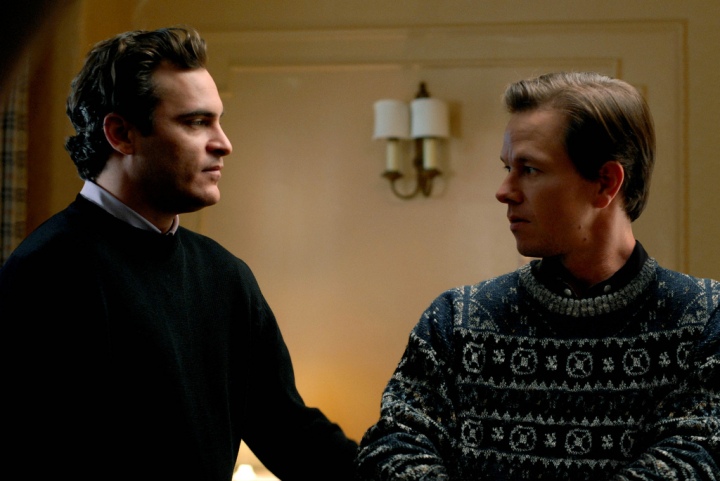
#127. We Own the Night (2007, Gray)
It’s become clear to me at this point (with only Two Lovers left to watch), that James Gray gives Joaquin Phoenix grand character arcs that run record long distances in a short period of time. In The Yards he’s fun-loving and supportive, then cowardly and jealous to all kinds of too-far-gone mixed up. In The Immigrant he’s a charlatan to a possibly dangerous stray dog in love to sacrificial raw meat. And then there’s We Own the Night, which could also lovingly be called The Joaquin Phoenix Show. Full of dismissive defense mechanisms towards his family (getting high and feigning boredom) and underground success and love but by the end, it’s a 180; something lost and something gained. What is lost is Eva Mendes and the self-chosen club environment and (dependent) success he naturally drifted towards. What he’s gained is a position society can be proud of, and the love of his family, most importantly his brother. One love traded for another very different kind of love. It’s an incredibly bittersweet trade-off, and not just because the bridge between the two is the loss and subsequent vengeful recompense of their father.
Phoenix spends most of the film, even when he’s sticking his neck out for them, an outsider looking in on his own family, a tolerated third wheel.
Once again with James Gray; Choices, Family, New York. Gray and the cinematographers he works with have an uncommon ability to constantly and observantly capture actors; nothing seems preordained in these performances. The writer/director works with familiar stories and genre conventions while having a knack for spending all that narrative time oh-so-carefully mapping out characters and their multi-faceted relations. In this case it’s all about Bobby (Phoenix), so much so that pretty much everyone else ends up being a bit underwritten as a result. Where Bobby stands with those in his life is constantly charted. Everything flip-flops for him. What would normally be a fraught and traumatic, but ultimately uphill, battle ends up being an complex aforementioned trade-off. Conventions come through characters and their choices, as opposed to characters and their choices coming through conventions.
Well, it’s certainly safe to say that the man knows how to end a film. There is something indefinably powerful about that final image. What is it? The simplicity of it? The words being spoken out and not towards? That slight zoom or how head-on it is?
It’s the Little Things:
A black-and-white montage of New York police photos transitioning to Joaquin Phoenix in red walking towards reclining Mendes while “Heart of Glass” plays; sexiest thing in a film I’ve seen since re-watching The More the Merrier
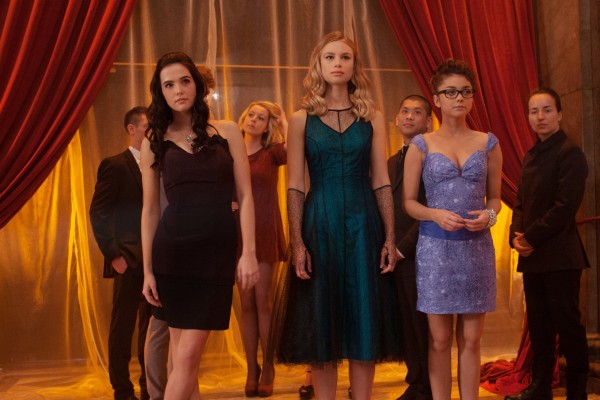
#128. Vampire Academy (2014, Waters)
Every so often you run into a film that you recognize as being a scattershot botch job, seemingly beyond repair, but you still like it, a lot, despite everything. Vampire Academy is one of those films. Now that suggests all the pieces are somehow lacking, which isn’t the case. There’s a lot that works about Vampire Academy, and despite its box-office flop status and universal pans, I believe the film will slowly but surely find some kind of audience.
The main detractor is that it suffers from the kind of Adaptation Inflammation that tends to plague adaptations of world-building heavy YA films. This one even has the nerve to throw terminology as onscreen text, like a trippy test review session. The harder the world-building efforts (also taking into account its low budget), the more everything feels inconsequential as opposed to realized. So there’s an unfortunate dwarfing effect from the get-go. As if the exposition weren’t enough, Vampire Academy makes the mistake of acting like the start of a movie franchise so are endless extraneous elements and characters that have no bearing on the story at hand, and are there to assuredly set up future installments that will only exist in the books. So there is no shortage of dead, and undead, weight.
World-building skeletons with a side helping of complicated etymology exists in all self-serious YA franchises. But Vampire Academy blends (to inconsistent results) that skeleton with the playfully bitchy high school lampoon act its makers (Mark Waters of Mean Girls and Daniel Waters of Heathers) are known for. But instead of the latter subverting the former, they end up feeding off each other til there’s not much left.
But on second thought, I’d say there’s quite a bit left. Yes it’s a mess, but damn if it isn’t an entertaining and sardonic mess. Zoey Deutch alone is a real find, heavily recalling both Ellen Page and a young Lauren Graham, with constantly varying and left-field comic sensibility. She can be annoying and a bit much, but I found her Rose Hathaway badass and lovable, an antidote to the furrowed brows and self-sacrificing heroines of dystopian and supernatural worlds. It would be a travesty, yes a travesty, if we don’t see a lot more of her in the future. Lucy Fry as Lissa is quite memorable too, regal and fluttery; good enough to make us forgive weak screenwriting that flat-out says NO to the transition and logic of character motivation.
For all the bland-boy romance (and let’s be honest, so many female-led films suffer from Bland Boy Syndrome), the friendship between Rose and Lissa (Fry) comes first. It is never lost for a second that they have the most important bond, in sync and connected forever. They are soulmates. Lissa even gives a speech at the end where she’s all ‘I wish you all could have your own Rose Hathaway, I’m the luckiest gal in town’. And Lissa, and the film, even make room for welcome and timely commentary on slut-shaming.
All in all, I wanted to stay in this world. I even want to pick up the second book and give it a try. Mark Waters and Daniel Waters drown a bit in the fold of YA, but with the help of Zoey Deutch they are able to come up for air quite often. The results allow teenage girls to have all kinds of non-judgmental sexual yearnings in a PG-13 world, with snarky growing pains winning out over the arduous and usually meaningless weight others of the same cloth so often bore us to tears with.
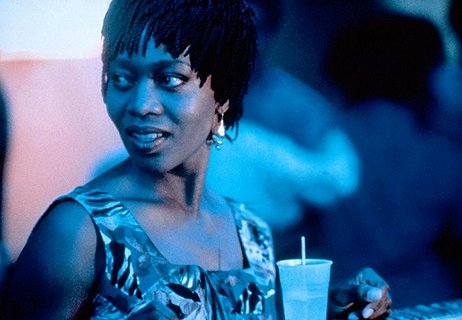
#129. Passion Fish (1992, Sayles)
Literary and laid back in ways May-Alice (Mary McDonnell) and Chantelle (Alfre Woodard) can only strive towards. John Sayles (this is admittedly the first film I’ve seen of his) attains the restfulness and ease both seek. The characters catch up to the film. They are restricted to backwoods Louisiana for different but not dissimilar reasons. Rennie (David Straitharn) and Sugar LeDoux (Vondie Curtis-Hall) recur as potential male companions, but everyone else visits once and only once. People pass through while the two remain stationary.
Fade-to-blacks are usually used as prelude to a passage of time, but Sayles consistently and overtly uses them to emphasize a lack of movement or change. That progress is at a standstill for May-Alice because of her self-absorbed obstinance. Stasis, and the gradual movement away from it, and the acceptance that erases it, is at the center of Passion Fish. From May-Alice’s attitude towards her paralysis to Chantelle’s inner demons and dependency on her job as caretaker. When Rennie takes the two out for a late-film boat sojourn it critically signals movement within stasis, an openness to their surroundings and to each other.
Mary McDonnell and Alfre Woodard give two beautifully realized performances as equally willful women with a push-pull dependency built on hesitance. The former spouts and drinks, swears and lashes out. The latter desperately bottles everything to keep control of herself, her guardedness hiding immense vulnerability. Chantelle is at once sheepish and direct. Their friendship, though both would hesitate to call it that for most of the runtime, is constantly shifting and developing, the two actresses always able to pinpoint where their characters are (even if the audience isn’t made privy) at any given moment. May-Alice comes to realize she needs Chantelle (both for support and as someone willing to stand up to her) long before Chantelle admits this, or accepts this as mutually beneficial beyond survival.
Sayles does right by the Louisiana milieu outside of some random bouts of broadness (Precious anyone?), recognizing that there was a reason May-Alice left Louisiana as soon as she was old enough, without dipping into pandering. Passion Fish could so easily smack of a been-there-done-that TV movie (or shitty movie) territory or worse, of a black character entering the scene to help stabilize a white character. And though Chantelle is introduced into May-Alice’s story, it very quickly becomes a co-lead film, where each are paid equal mind, mutually dependent, not one an appendage of the other. In fact, as great as McDonnell is, Woodard as Chantelle emerges as the character and performance that resonates more deeply. Have I mentioned how amazing she is in this? Because I’d say from all my 1992 watches and re-watches so far, it’s this lead female performance that has knocked my socks off. Interracial friendships and bonding depiction in film can also easily end up being a catalyst allowing white people to feel good about themselves (for a most egregious example, see; The Help), placement and purpose renders them props no matter how well-written or performed the individual character(s) is(are). Passion Fish sidesteps all this for a deft and carefully observed study of two fully realized women whose fates are intertwined for better and worse.
Great points about Passion Fish. It was one of the last Sayles movies that I watched since it just didn’t sound that interesting, and boy was I wrong. The acting is so good from the two leads, and it’s one of his most interesting films.